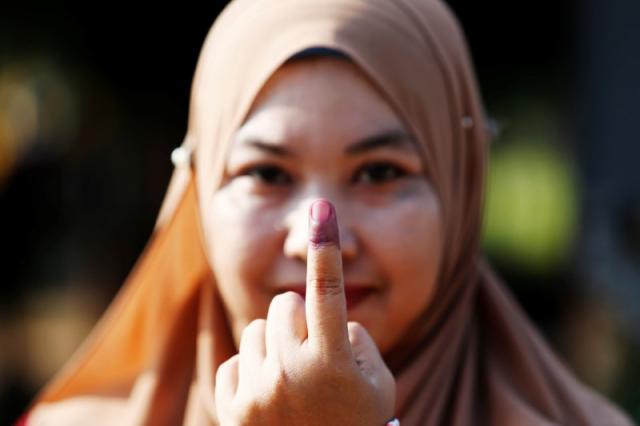The long-ruling Barisan Nasional (BN) coalition faces a far greater challenge than ever before in the Southeast Asian Muslim-majority nation, with public anger over rising prices and a multi-billion-dollar scandal that has dogged Najib since 2015.
An election-eve opinion poll suggested that the ruling coalition’s support was slipping and that Mahathir’s Pakatan Harapan (Alliance of Hope) would land more votes in peninsular Malaysia, home to 80 percent of the population.
However, under Malaysia’s first-past-the-post system, the party or alliance with the majority of seats in the 222-member parliament wins. Most experts believe that is within Najib’s reach.
“I think right now, it looks more favorable to BN ... however, the margin that we’re talking about is very small,” said Mohamed Nawab Mohamed Osman, a Malaysia scholar at the S. Rajaratnam School of International Studies in Singapore.
The opposition has claimed the contest is skewed after the government redrew electoral boundaries and set a mid-week poll date that discouraged millions from voting, but the government and the Election Commission have dismissed the accusations.
The Election Commission said that 69 percent of the roughly 15 million registered voters had cast their vote as of 0700 GMT, two hours before polls close.
Around 85 percent voted at the last election in 2013.
Voters complained on social media groups of long queues outside polling centers, which resulted in a waiting time of up to three hours or more for some. Opposition leaders called for voting hours to be extended so that all voters are able to participate.
Most results are expected before midnight (1600 GMT) but the count may spill into the early hours of Thursday.
“This is a big day for Malaysia as this is when we decide our future,” said cardiologist Hasri Samion at a polling station in central Kuala Lumpur. “I think the people have been complacent for too long. We need a visionary to lead Malaysia.”
Najib, casting his vote, said he was confident of victory following what he described as “quite vicious” personal attacks during the campaign.
DIRTY TRICKS
Leaders from both the opposition alliance and the ruling party claimed their communications were being disrupted by non-stop spam calls on their mobile phones as voting progressed.
The Malaysian Communications and Multimedia Commission said in a statement that an initial investigation into the spam calls pointed to anonymous bot (automated program) attacks from various sources and on various targets irrespective of political parties.
The pre-election survey published by independent pollster Merdeka Center on Tuesday said BN looked set to win 100 constituencies nationwide and the opposition 83. With these numbers, neither camp would have the 112 seats required to rule and the result will hinge on 37 seats that the pollster said were too close to call.
At the last election, BN lost the majority vote in its worst performance ever, but pulled in 133 seats.
Unless he improves on that tally, Najib could come under pressure within his United Malays National Organisation (UMNO) party to stand aside ahead of the next election, analysts say.
Malaysia’s majority ethnic Malay Muslims support BN for affirmative-action policies that give them government contracts, cheap housing and guaranteed university admissions.
Mahathir’s opposition alliance, which counts on urban votes and support from the minority ethnic Chinese and Indian communities, is hoping that with the long-ruling former leader as its standard bearer, it will draw in Malay voters traditionally loyal to BN.
Nawab, the scholar, said there was a small chance that neither BN nor the opposition secures a majority, which would bring a “hung parliament” and potentially put the Islamic Parti Islam se-Malaysia (PAS) in the position of kingmaker.
However, political analysts believe PAS will fall short of the 21 seats it won in 2013. The Merdeka poll had it winning just two seats.
Mahathir is a polarizing figure and many voters are suspicious of him because of his attacks on independent institutions when he was prime minister between 1981 and 2003.
But Najib has another formidable opponent in former deputy prime minister Anwar Ibrahim, who is currently serving a five-year prison sentence on a sodomy conviction that has been attacked by human rights groups as politically motivated.
Anwar led the opposition in the 2008 and 2013 polls. In an unlikely reconciliation, he has joined hands with Mahathir, who sacked him as his deputy in 1998.
Najib, 64, has been buffeted by the scandal over 1Malaysia Development Berhad (1MDB), a state fund from which billions of dollars were allegedly siphoned off.
U.S. Attorney-General Jeff Sessions has described the scandal at the sovereign fund set up by Najib as the worst form of kleptocracy. The U.S. Department of Justice has filed several lawsuits to seize more than $1.7 billion in assets believed to have been stolen from 1MDB.
Najib, who was chairman of 1MDB’s advisory board, has denied any wrongdoing and has been cleared of any offence by the attorney general.
REUTERS
More about: Malaysia
















































